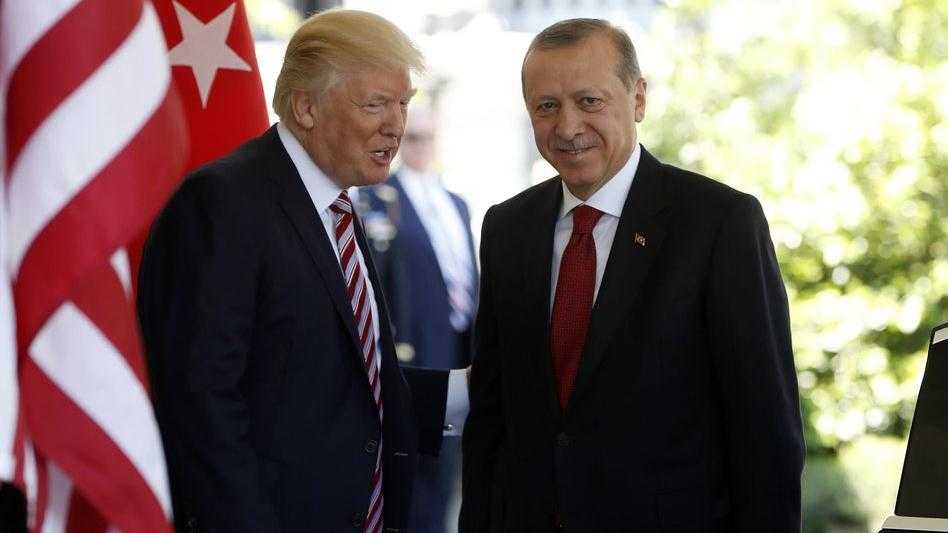By Edward G. Stafford, Ahval
The United States imposed sanctions early this week on Turkey’s Presidency of Defence Industries (SSB) pursuant to the Countering America’s Adversaries through Sanctions Act (CAATSA) for procuring the Russian-made S-400 missile system.
The sanctions include a ban on all U.S. export licenses and authorisations to the SSB and an asset freeze and visa restrictions on İsmail Demir, SSB’s president, and other SSB officers.
Not without some irony, this announcement came on the same day that the U.S. Electoral College voted, officially confirming Joe Biden’s status as President-elect. Why this decision to proceed with the long-demanded imposition of sanctions is a boon to President-elect Biden.
But first, the background of the decision. President Donald Trump sees himself as a deal-maker, always making decisions from a transactional perspective. What did he gain or hope to gain by finally acceding to pressure to impose the sanctions?
In domestic politics, both Republicans and Democrats in Congress, especially in the Senate, have pressed Trump to impose CAATSA sanctions on Turkey for having acquired the S-400s. With two Senate seats to be decided in early January, Trump’s actions will blunt any efforts by Democrats to portray the Republicans as soft on Russian President Vladimir Putin or his Turkish counterpart Recep Tayyip Erdoğan and unite the Republicans.
The Republican Party will be better able to raise money from colleagues who have wanted Trump to impose sanctions for some time, in particular Lindsay Graham and Tom Cotton, and thus better their prospects. Unifying the party was a small contributing factor to ending Trump’s resistance to imposing sanctions.
Next, we need to look to newly established relations between Israel and several Muslim-majority Arab countries, as well as the war in Syria.
Ending the diplomatic isolation of Israel was a major component of the Trump foreign policy, one that has made substantial progress. In parallel, the Trump administration attempted to coax Turkey (Erdoğan) into a better relationship with Israel.
To keep the channels of communication open and friendly, the Trump administration resisted calls for sanctions against Turkey, as well as saying very little when Turkish employees of the U.S. embassy were convicted on spurious charges and regarding the arrest and incarceration of dual-national scientist Serkan Gölge.
Likewise in Syria, Trump portrayed himself as Erdoğan’s partner in part so that the Turkish president would tone down his anti-Israel rhetoric – though it is hard to see that Trump got as much as he expected in this or any other exchange with Erdoğan regarding Syria.
It is hard to discern any real gains with Turkey towards the U.S. policy goal of better relations with Israel through the investment of silence or support for Turkey’s actions in Syria. It appears Turkey forestalled sanctions and suffered little losses for doing so.
In part, the lack of leverage is due to the cost-cutting benefits of the United States rejecting a proposed purchase of 100 F-35 stealth fighter jets by Turkey. The U.S. suspension of participation in the F-35 production and procurement programme could yield savings of billions of dollars for Turkey.
It also denies new high-tech “toys” for disloyal or suspect Turkish air force officers seen by Erdoğan as principal actors in the July 2016 coup attempt. The loss of access to U.S. technology for Turkish arms exports that CAATSA imposes, however, may get his attention – it will certainly matter to the Turkish defence industry.
Most importantly, at least for Trump’s advisers and his allies in the Senate, imposing the sanctions repudiates the notion that Trump is somehow turning a blind eye to the efforts of Putin to disrupt NATO and of Erdoğan to behave contrary to alliance solidarity without repercussion.
The United States would not be taken seriously by others within and outside the military alliance if it didn’t sanction Turkey. If NATO pronouncements on the need for collective action and solidarity are to have any weight, there must be a price when that solidarity is broken.
All of the above is background to the larger issue – what will Biden do when he is sworn-in on Jan. 20? Did Trump make Biden’s efforts to draw Erdoğan back into the NATO/Western family easier or harder?
Firstly, with sanctions now imposed, Biden will face no pressure from Democratic senators, Robert Menendez most of all, to apply sanctions, though they may ask for them to be broadened and toughened. He certainly will not face pressure from Congress to reverse the imposition of CAATSA sanctions.
Secondly, Biden will have a bit more leverage with Erdoğan, if the latter wishes to have the sanctions lifted. That is by no means certain, for Erdoğan has done well in elections by portraying himself and Turkey as victims of the evil Western powers.
But, Erdoğan may look more intensively for even small changes to help him out of his economic predicament, as the loss of arms exports takes its toll and adds pressure on the already-fragile Turkish economy.
Thirdly, by imposing sanctions before his successor takes office, Trump, who is often portrayed as an Islamophobe in the media, has made it harder for Erdoğan to rail against the incoming Biden administration as anti-Muslim. Biden’s credentials as an inclusive, progressive thinking politician are regularly trumpeted by the media so accusations of Islamophobia laid at his feet will get little traction.
In sum, Trump’s decision to finally impose CAATSA sanctions on the very day Biden was formally elected makes it likely that Erdoğan will have to shift away from animosity towards Israel, cosying up to Russia and being disruptive within NATO. Of course, that depends on Erdoğan putting the needs and concerns of the Turkish people above his ambitions to be the dominant political player in the greater Middle East and pre-eminent Muslim leader in the world. Stay tuned.





